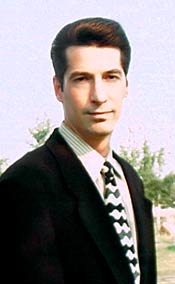| |
 |
|
After managing a computer training enterprise
for two years, and serving several more years a technologist/visionary
for a management consulting firm catering to Fortune 500 companies,
Jeff Ritter entered public service with a single intent: to
structure the business climate in Oregon in step with the
Information Age so that others like him could live and work
anywhere in the state. In pursuit of this goal, he was appointed
Statewide Coordinator for Telecommunications, Industrial and
Regional Projects from 1993-2000 (Oregon Community and Economic
Development Department). During his tenure, Ritter established
information-centric practices and implemented a number of
projects directly responsible for creating over 2,000 jobs.
He initiated and staffed the Oregon Telecommunications Forum,
a statewide grass-roots effort sponsored by the Office of
the Governor and later mandated by the Oregon Legislature.
The process involved over 1,500 residents statewide in a goal-setting
and planning framework that served to raise awareness of issues
relative to telecommunications.
|
After detractors shut down the Telecommunications Forum, Ritter sponsored
SmartOregon, a statewide information technology think tank. SmartOregon's
greatest accomplishment was a research product consisting of over
60 case studies (2 per county) focused on business models that leveraged
information technology for competitive success. The project, which
was implemented prior to the Dot Com boom of the late 90's, carried
with it a restrictive mandate (imposed by Ritter)-to showcase technology
consumers, rather than producers (hardware manufacturers, software
producers, telecommunications companies, ISPs and consultants were
exempted). Although many stakeholders felt this to be an impossible
task, appropriate case studies were ultimately identified. The enlightened
awareness stemming from the distribution of the case studies spawned
a new wave of community interest. The momentum primed the entire state
for forthcoming telecommunications development opportunities, many
of which became models unique to the Pacific Northwest.
On January 1, 2000, Ritter established Technomethods Corporation
(www.technomethods.com), a telecommunications consulting firm dedicated
to leveraging telecommunications opportunities for communities.
Technomethods developed strategic planning methods and options for
implementing better municipal and regional telecommunications services.
To date, Technomethods has implemented telecommunications planning
and alternative infrastructure projects spanning the states of Washington,
Oregon, California, and Nevada.
One of Ritter's most significant accomplishments was the Oregon
Open Access Fiber Route: a stretch of fiber optic cable providing
high-speed connectivity alternatives for 18 communities located
near the 500-mile route. The new infrastructure represented a $35
million investment for the communities and directly resulted in
$2.5 million worth of dark fiber assets transferred to a consortia
of community partners. In 2000, the project was recognized as the
best telecommunications infrastructure project in the country through
a competition sponsored by AOL and the National Association of Small
Communities (NCSA). The project was also chosen as one of 12 best
practices featured in "Technology and Grit at the Grassroots,
Information Technology, Community Engagement, and Jobs in Distressed
Rural Communities," a guide that was published in June, 2002,
jointly by the Economic Development Administration and the NCSA.
In 2002, Technomethods won a competitive bid to implement the Klamath
Technology Center, a project funded by the Economic Development
Administration and USDA Rural Development. The Center, scheduled
to be online by the second quarter of 2003, is envisioned as a hub
and anchor point for technology access, open access computer learning,
and further grass-roots telecommunications development that will
serve to generate new synergies for economic expansion among information
sectors.
Through Technomethods, Jeff Ritter continues to promote community-driven
alternatives to incumbent monopoly telecommunications infrastructure.
Success, he has discovered, has been the strongest weapon in his
personal war against the oppressive RBOC machines. His favorite
quote: "Never doubt that a small group of thoughtful, committed
people can change the world. Indeed, it is the only thing that ever
has." -Mararet Meade, Anthropologist.
|

